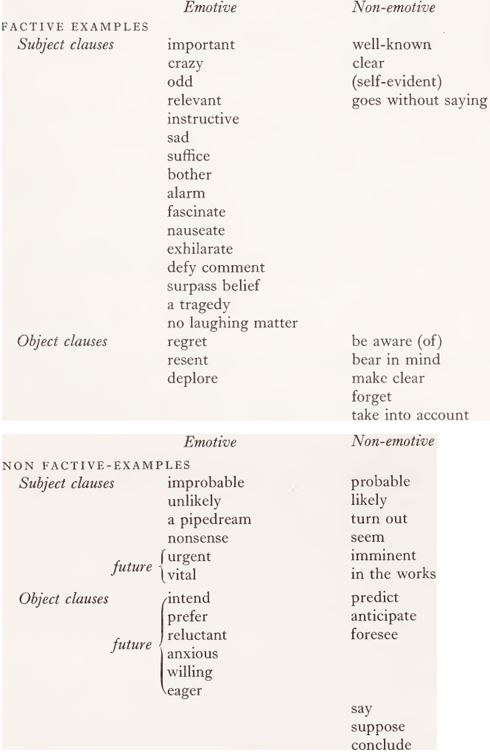


 Grammar
Grammar
 Tenses
Tenses
 Present
Present
 Past
Past
 Future
Future
 Parts Of Speech
Parts Of Speech
 Nouns
Nouns
 Verbs
Verbs
 Adverbs
Adverbs
 Adjectives
Adjectives
 Pronouns
Pronouns
 Pre Position
Pre Position
 Preposition by function
Preposition by function 
 Preposition by construction
Preposition by construction
 Conjunctions
Conjunctions
 Interjections
Interjections
 Grammar Rules
Grammar Rules
 Linguistics
Linguistics
 Semantics
Semantics
 Pragmatics
Pragmatics
 Reading Comprehension
Reading Comprehension|
Read More
Date: 2023-04-12
Date: 2023-11-11
Date: 2023-08-08
|
In the above discussion we rejected Rosenbaum’s derivation of infinitive complements like
I believe John to have liked Anselm
I forced John to say ‘cheese’
from hypothetical underlying forms with for-to:
*I believe for John to have liked Anselm
*I forced John for John to say ‘cheese’.
This leaves us with the onus of explaining the for-to complements which actually occur on the surface:
It bothers me for John to have hallucinations
I regret for you to be in this fix.
But once the spurious for-to's are stripped away, it becomes clear that the remaining real cases occur with a semantically natural class of predicates. Across the distinction of factivity there cuts orthogonally another semantic distinction, which we term emotivity. Emotive complements are those to which the speaker expresses a subjective, emotional, or evaluative reaction. The class of predicates taking emotive complements includes the verbs of emotion of classical grammar, and Klima’s affective predicates (Klima 1964), but is larger than either and includes in general all predicates which express the subjective value of a proposition rather than knowledge about it or its truth value. It is this class of predicates to which for-to complements are limited. The following list illustrates the wide range of meanings to be found and shows the cross-classification of emotivity and factivity:

We have proposed that infinitives are derived in complements whose verbs fail to undergo agreement with a subject. In the infinitives, agreement did not take place because the subject was in one or another way eliminated by a transformation. There is a second possible reason for non-agreement. This is that the subject is marked with an oblique case. There seem to be no instances, at least in the Indo-European languages, of verbs agreeing in person and number with anything else than nominative noun phrases. Good illustrations of this point are the German pairs
Ich werde betrogen ‘ I am cheated ’
Mir wird geschmeichelt ‘ I am flattered ’
Ich bin leicht zu betriigen ‘ I am easy to cheat ’
Mir ist leicht zu schmeicheln ‘I am easy to flatter’.
Presumably the same syntactic processes underlie both sentences in each pair. The accusative object of betrügen is changed into a nominative, whereas the dative object of schmeicheln stays in the dative. But from the viewpoint of agreement, only the nominative counts as a surface subject.
As the source of for with the infinitive we assume a transformation which marks the subjects in complements of emotive predicates with for, the non-finite verb form being a consequence of the oblique case of the subject.
We can here only list quickly some of the other syntactic properties which emotivity is connected to, giving an unfortunately oversimplified picture of a series of extremely complex and difficult problems. What follows are only suggestive remarks which we plan to pursue at a later time.
First of all, emotives may optionally contain the subjunctive marker should:
It’s interesting that you should have said so
*It’s well-known that you should have said so.
(We do not of course mean the should of obligation or the should of future expectation, which are not limited to emotives).
We assume that a future should is optionally deleted by a late rule, leaving a bare infinitive:
I’m anxious that he (should) be found
It’s urgent that he (should) be found.
Emotive complements can be identified by their ability to contain a class of exclamatory degree adverbs such as at all or (unstressed) so, such:
It’s interesting that he came at all
*It’s well-known that he came at all.
Finally, it seems that one of the conditions which must be placed on relativization by as is that the clause be non-emotive although many other factors are certainly involved:
*As is interesting, John is in India
As is well-known, John is in India.
|
|
|
|
"عادة ليلية" قد تكون المفتاح للوقاية من الخرف
|
|
|
|
|
|
|
ممتص الصدمات: طريقة عمله وأهميته وأبرز علامات تلفه
|
|
|
|
|
|
|
المجمع العلمي للقرآن الكريم يقيم جلسة حوارية لطلبة جامعة الكوفة
|
|
|